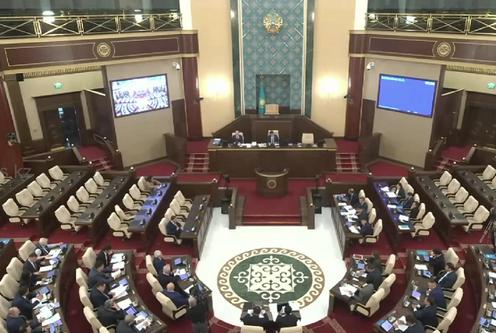Kazakhstan’s Mazhilis (lower house of parliament) has passed a law banning “propaganda” of LGBT issues (the LGBT movement is recognized as extremist and banned in Russia) and pedophilia in the media, telecommunications networks, and online platforms. The lower house announced the decision on its official Telegram channel. The amendment was added to a bill on archival affairs considered today.
“A separate section establishes measures to protect children from content harmful to their health and development. The dissemination of information containing propaganda of pedophilia and/or nontraditional sexual orientation in public spaces, as well as through media, telecommunications networks, and online platforms, is prohibited,” the statement reads.
According to deputy Yelnur Beisenbayev, the amendment introduces changes to nine laws — including those on child rights, advertising, communications, culture, education, cinema, media, and online platforms. The legislation will include a definition of “propaganda of nontraditional orientation,” and its dissemination through media, the internet, and telecommunications channels will be banned.
“We see that children and teenagers encounter information online every day that can negatively influence their understanding of family, morality, and the future. Protecting the consciousness of the younger generation from illegal content is a matter of their safety and mental health,” Beisenbayev said.
Deputy Minister of Culture and Information Yevgeny Kochetov added that “LGBT propaganda means encouraging a positive public assessment of nontraditional orientation.”
“All those moments when people claim that some are better than others — that being this way is good, and that way is bad — those are elements of propaganda. So wherever there is a positive public assessment, that will be considered propaganda. Simple mention, reporting, or presentation of statistics is not,” he said.
Another lawmaker, Nikita Shatalov, dismissed criticism from international human rights organizations, which called the amendment a violation of human rights.
“It is nonsense for anyone to try to impose their point of view through information pressure. When these organizations talk about violations of international obligations, they themselves break international norms by trying to pressure us. That is unacceptable,” Shatalov said.
Over the past two years, three petitions demanding a ban on LGBT propaganda have been created in Kazakhstan, each gathering the more than 50,000 signatures required for government review. Initially, the amendment was to be included in the draft law “On Mass Media,” but it “disappeared” by the second reading. Eventually, it was added to the bill on archival affairs, which will now move to the Senate (upper house) for consideration.










